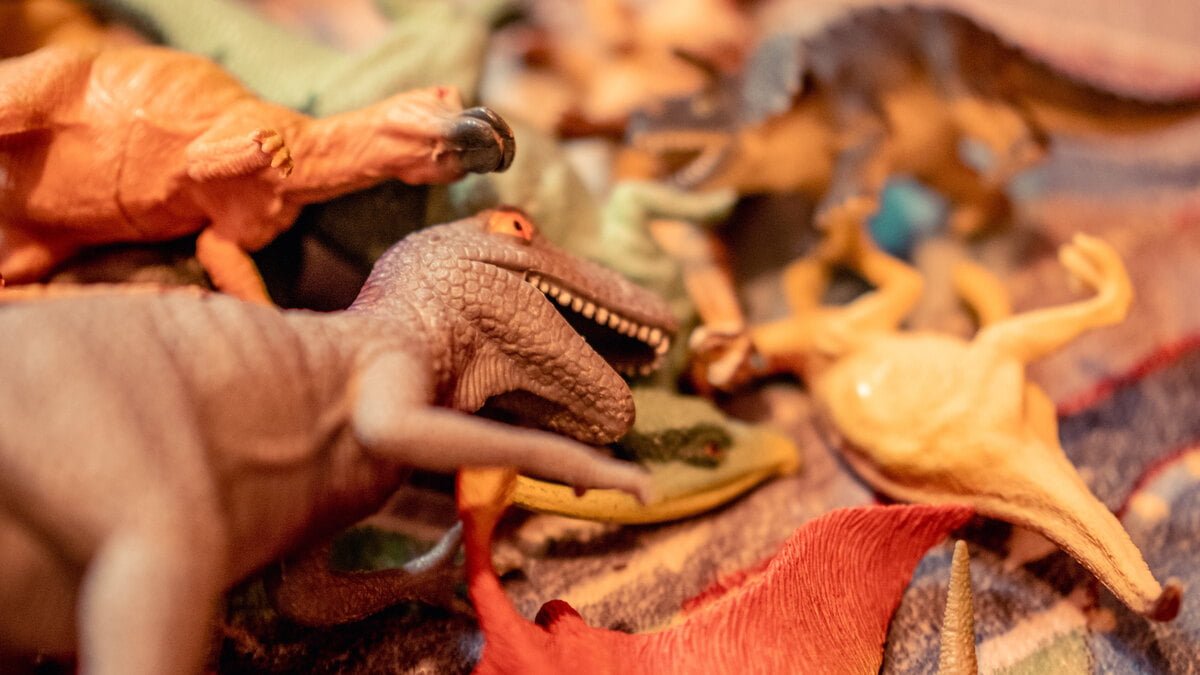One thing has been held for centuries: children love dinosaurs. They beg for dinosaur toys, adorn their rooms with dinosaur posters, and become engrossed in dinosaur films. The concept of conceptual domains or topics of “intense interest” is the most likely source of this obsession with dinosaurs.
You may wonder: why do kids like dinosaurs so much when most adults take little interest? Psychological research suggests that an early obsession with dinosaurs indicates the phenomenon of intense interest.
Learning about dinosaurs gives children the knowledge that few adults have and allows children to fulfill a desire to answer their questions. Researchers have investigated why children are so fascinated with dinosaurs and why the interest may fade out later in life.
As it turns out, there’s a scientific explanation and defense for children’s deep love of our distant and majestic predecessors. Keep reading as we explore this subject further.
Why is Your Child Obsessed with Dinosaurs?
It is somewhat common for parents to discover their child’s interest in dinosaurs sometime after it has developed.
According to a psychology study conducted in 2008 and published in Cognitive Development, children are most likely to adopt “intense interests,” often dinosaurs, without their parents noticing. This usually happens around the age of four.
You might notice that your child is becoming extremely curious about dinosaurs. Some memorize extensive facts and information about dinosaurs and spend hours looking at books.
This is a common trait of children at this stage of development. It’s one that paleontologists recommend you invest in and encourage.
Researchers believe that a dinosaur obsession stems from a child’s instinct for curiosity and discovery. Dinosaurs are an accessible form of science to children.
Their young minds can grasp that these gigantic creatures once lived, without needing to understand mathematical principles or, say, chemistry. They’re simply extinct animals.
Many children seek to memorize everything there is to know about dinosaurs. Developing a passion for learning about a topic helps to build valuable skill sets. Children have questions that their parents cannot answer. Then they learn how to research on their own.
Why Do Some Children Gravitate to Dinosaurs More Than Others?
Within the current research on children and dinosaurs, one trend indicates that boys are far more likely to develop an intense interest in dinosaurs than girls.
Why the disparity? Researchers think that studying dinosaurs draws on the brain’s ability to think systematically, that is, the brain’s ability to classify and sort information.
Boys’ brains tend to be naturally more systematic than those of girls, whose minds seem more emotionally aware than systematic. Researchers think that boys can more easily enjoy classification-based dinosaur knowledge.
Do not take this to mean that girls who like dinosaurs are abnormal. Some sociological research suggests that young boys’ interest in dinosaurs is simply a societally-imposed gender norm, rather than a difference in cognitive functions.
Intense interests do seem to develop and intensify when playmates share them. It does seem likely that boys, being more apt to find other boys who like dinosaurs, will develop the interest more deeply than girls, who might receive negative social feedback.
According to the referenced study, around 40% of all children are intensely interested in pretend play. This includes dinosaurs but may also include airplanes or dolls. Whatever a child takes an interest in, caregivers should encourage them to pursue it.
Why Should Kids Learn About Dinosaurs?
Kids who are interested in dinosaurs are expressing an interest in pretend play and a propensity for scientific thinking. Girls who develop their interest in dinosaurs may grow up with a continued interest in science and discovery, which could improve the current gender gap in the scientific community.

A dinosaur obsession could be the seed of any child’s interest in science. Children process the world by asking questions and seeking answers, while simultaneously making connections between different topics. If they ask questions that their parents can’t answer, they learn to find answers from new sources.
One passage from the Cognitive Development article summarizes this:
Conceptual domains typically have not been considered in either analyses of talent development or children’s preferred play objects. Parent reports confirm, however, that interest in such domains motivates some children to pursue domain-relevant information through books (typically read to them by others), digital media, videotapes, and toy models that support learning (Johnson, Alexander, et al., 2004).
The development of conceptual interests in young children via www.sciencedirect.com
As an educator, I assure you that these are vital for children’s brain development and critical skills later in life. Paleontologist Ashley Hall noted in this New York Times article that dinosaur interest, for many kids, is a “gateway to science.” The evidence certainly suggests that this is true, leading some to suggest that interest in dinosaurs makes children smarter.
While many children’s interest in dinosaurs might diminish as they enter school age and are required to use brain space for specific learning standards, the joy of discovering and forming connections around the awe-inspiring dinosaurs could lead children to find the same joy in scientific learning.
Intense Interests Hold Benefits for Later Education
Cognitively, there do seem to be more benefits to an intense interest in dinosaurs. The 2008 study by the University of Indiana and the University of Wisconsin indicates that opportunities to develop interests like dinosaurs can lead kids to have improved attention and skills for processing complex ideas in systematic ways.
With each new dinosaur discovery, children can learn the similarities and differences of each and gain a sense of accomplishment.
It’s also important that kids learn about dinosaurs because dinosaurs are a topic that we, as humans, are universally drawn to admire. We are fascinated by their dominance of the world, but, importantly for children, we don’t have to be scared of them. Connecting learning with a sense of safety may make children more apt to enjoy the learning process.
Additionally, kids who can memorize facts about dinosaurs will get to enjoy the feeling of knowing more about a topic than most of the adults they know/ Hopefully, that feeling propels them to pursue knowledge across the board.
Did you ever notice how easily children can recite dinosaur names while most adults struggle? We cover the topic of dinosaur names in another article, so take a look if you’re curious.
Adults might even enjoy learning with their children. This can be a great way to bond and create positive associations with learning. Parents or caregivers must demonstrate that learning is a lifelong, joyous process.
Some Benefits of Playing With Dinosaurs
An intense interest in dinosaurs can also benefit children outside of academic settings. As noted in Highlights magazine, giving kids a chance to play with dinosaurs, especially if they’re already interested, often enables them to practice focused attention.
The need to tap into the systematic thinking of their brain prompts kids to focus their attention on the thinking and learning that they are currently doing much more than most activities in a day.
As children age, they become much less likely to have the same intense interests of early childhood. Studies suggest that a child’s obsession peaks between the ages of four to six, but then quickly dies out. Researchers suspect that the structure of standards-based schooling and pressure from peers to have more universal interests may extinguish a child’s fascination for dinosaurs and other diverse topics.
Encouraging play while at home is one way that parents can give their children ways to continue their interest in dinosaurs. even after formal schooling has begun, you can encourage children to continue their studies outside of school. Check out our article on dinosaur gifts for children to get some ideas on ways to encourage exploration through play.
Perhaps one benefit of at-home schooling in 2020 is that young children, having more time to engage in imaginary play with their dinosaur friends at home, might keep their interest in dinosaurs just a little bit longer.
How Do I Teach My Child About Dinosaurs?
As there are so many children who are fascinated with dinosaurs, and even so many adults who grew up loving the Jurassic Park genre, there are luckily an enormous amount of resources available for learning and teaching about dinosaurs.
This website is one place to start! You can read our other articles to learn why paleontology is important or how to conduct paleontology science projects. When your children are old enough, you can take them fossil hunting. I have a beginner’s guide to fossil hunting that covers all the basics.
Resources for Learning About Dinosaurs
A great activity is to buy picture-filled books that explain different types of dinosaurs. Exposing your child to multiple types of dinosaurs can give them a head start in scientific classification and thinking. Visual learners may benefit the most from these illustrations.
Dinosaurs are also an excellent source of independent learning. Children with an interest in dinosaurs can learn through play and their investigations, through books, videos, and the knowledge of other children or teachers at preschool.
You don’t even need to buy books to engage your child in learning about dinosaurs! YouTube has a plethora of dinosaur-related videos, which you can find simply by searching “dinosaurs for kids” (you may want to watch videos ahead of time to ensure they are appropriate for your child).
You can even find read-aloud books about dinosaurs (my nephew loves this one about T. rex). Many dinosaur-showing museums also have online, often interactive, dinosaur exhibits that you can tour with your child from home.
Paleontologists often recommend the Smithsonian or the interactive school program from the Natural History Museums of LA County. If you get the chance, visit your local museums and dinosaur parks. It can make for an inexpensive or even free family activity.
If you prefer to stay away from screens, you can simply play with your child. Educators have published many resources and fun activities that you can do with your kids. Scholastic has published an excellent list, which includes fun options such as creating your own “fossil dig,” dinosaur feeding, count and create, and dino balancing!
Why Do Kids Like Dinosaurs?
Dinosaurs remain a mystery. They were often large and monstrous by modern standards. Children have many questions that their curiosity demands be answered.
In seeking these answers, children often develop an intense interest in dinosaurs. This dinosaur phase is healthy. Children can gain confidence in obtaining knowledge of these animals through independent study. These are important traits that can make children smarter than their peers.
Children themselves may even introduce you to new ways to learn about and play with dinosaurs. As their intense interest, or obsession, develops, you might just watch them play and listen to the things they say. Even though we know that, scientifically, dinosaur play is helping your child’s brain grow and develop, it can still be fine to let them find their way.
Just while playing Jurassic Park on the play mat, my four-year-old nephew has given me, a writer with an adult-size intense interest in dinosaurs, new ideas to wonder about. I recommend that you smile, enjoy it, and, maybe, learn something new, too.
If you found this article useful, please help us out and share it. Leave us a comment to let us know if your children have a dinosaur obsession.


Dinosaurs are big scary monsters, they are real but they are dead (apart from some small feathery ones that are mostly not scary) so they pose no threat. I wonder if dinosaurs provide young children a mechanism to learn to handle their understandable fear of big scary things (adults?) and potential monsters that may lurk under the bed. In effect, dinosaurs become domesticated monsters, controlled by knowing their names and details, and by being shrunk, as toys, to a size that can be controlled by small children. There’s a broad mythogical theme of controlling others by using their names. Kids are remarkably adept at learning the often complex dinosaur names.
I think this is a great hypothesis. Dinosaurs are the monsters that were and not the monsters that could be, meaning that it’s comforting to know that the scary ones from the past can’t hurt us.
The use of a name to wield power is interesting. I immediately thought of “He-Who-Must-Not-Be-Named” from the Harry Potter series. Perhaps this is linked to some human associates we make with names.
Thanks for your comment!
i am actually a 10 year old and i still love dinosaurs since i was 2.
You’re never too old for dinosaurs!
“Why do my kids love dinosaurs?” isn’t an interesting question. The question worth asking is: “Why do you not?”
Paleontology is a legitimate and potent field of study that tells us a lot about the world we live in. It fills me with no small amount of annoyance that it’s far too often discussed as if it were something inherently juvenile.
Kids used to play “cowboys and indians” fairly often, didn’t they? Does that make an interest in American frontier history inherently childish? It’s a real subject. What about “cops and robbers”? Kids played that, too, yet crime dramas usually aren’t aimed at kids, nor is pursuing a career in law or law enforcement seen in such patronizing terms. What about sports? Kids tend to play them at a young age, too, yet no one is asking what draws children to this activity, nor is a sports obsession necessarily associated childhood.
The mystery of dinosaurs is something adults need to contemplate, not children. Stopping to consider that dinosaurs are, in fact, real should be a mind-blowing revelation for anyone. Why does that fact not stun you like Paul on the road to Damascus? And if our meager existence is part of something greater, as Paul discovered, then how can anything in this shriveled, materialistic world we’ve cocooned ourselves in seem important ever again?
Excellent points about how strange it is to consider dinosaurs juvenile. Many of our activities as children influence our adult lives.
Interestingly enough, various topics in science and history don’t draw the same criticisms for enthusiasm. Why would people grow out of dinosaurs but not space exploration? I never understood the distinction.
Hello. it’s me from Twitter. Thank you for telling me about this. Jack Horner actually said in a interview. he said kids like them cause they’re big, strong, and gone, which I agree with as well as this one. I fell in love with paleontology because you don’t know about it it’s mysterious that’s why I always loved it. 🙂
That’s a great point. They are something children could fear but they’re not around to harm us. Thanks for reading!